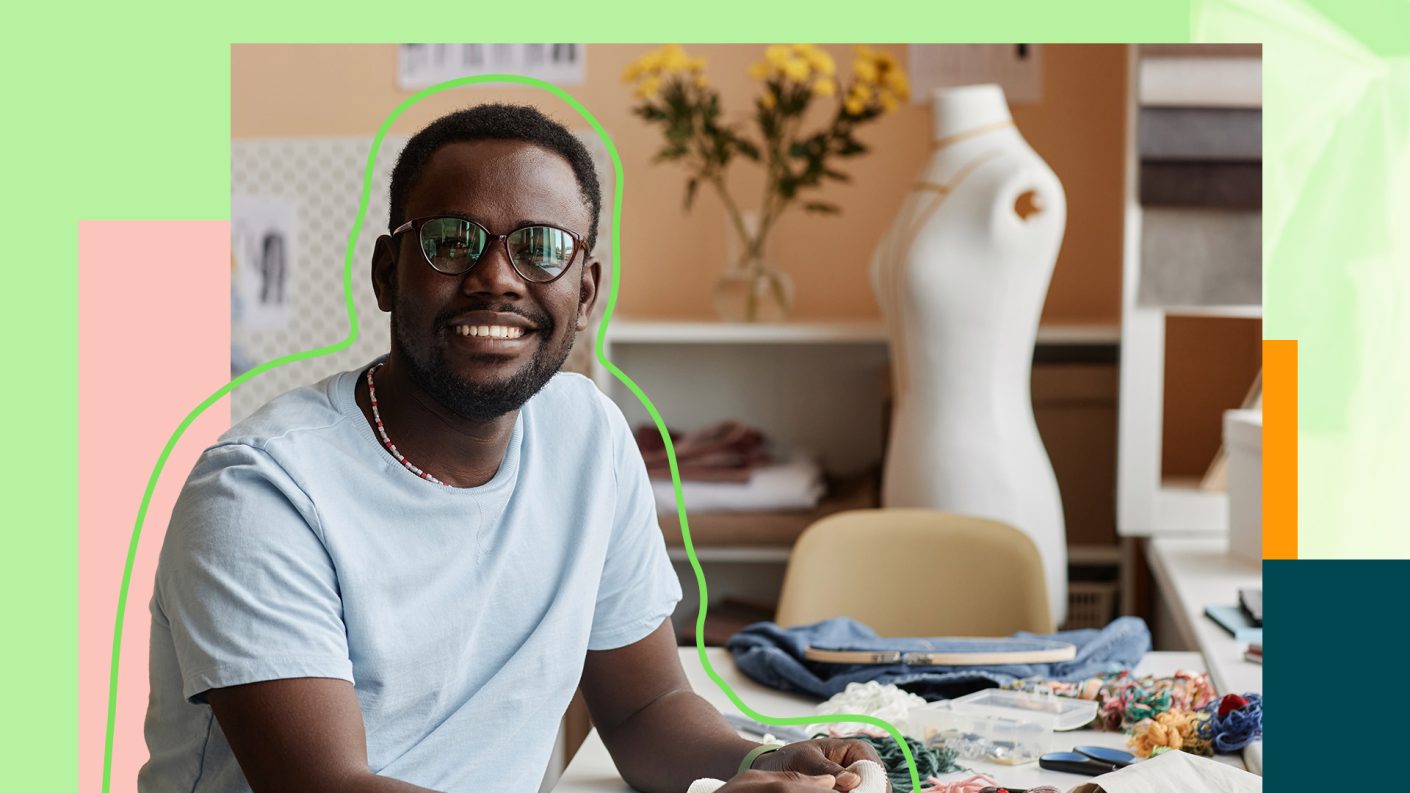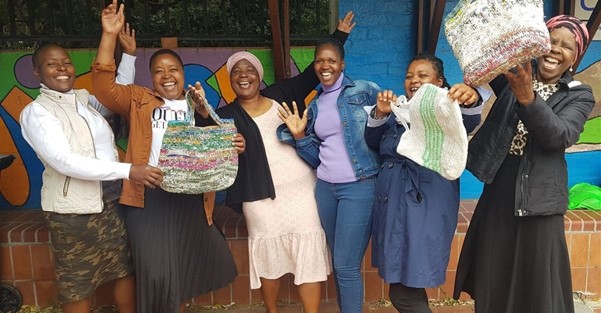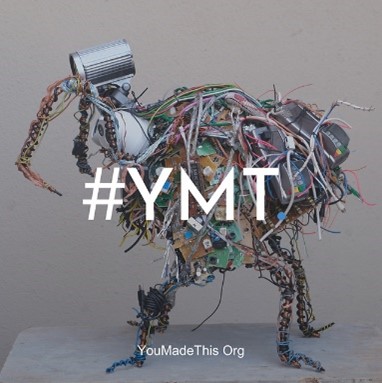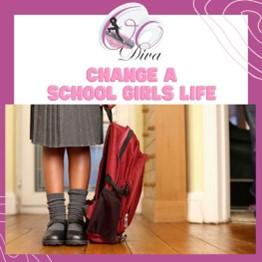Uplifting two birds with one stone: creating employment through upcycling
How regeneration is key to address social and economic marginalisation in South Africa.


Anneri Venter
24 January 2024
5 min read
At 31,9%, South Africa’s unemployment rate is the highest in the world. And considering that our youth unemployment rate amongst 15–24-year-olds stands at an eye-watering 58%, it is no surprise that many refer to this situation as a ticking time bomb. While these numbers are by no means unfamiliar to anyone in South Africa, in a country where concerns about unemployment are overshadowed by even bigger issues like rising crime rates and failing infrastructure, it becomes our responsibility. We need to find solutions that can address more than just the problem at hand, otherwise we continue to remain on the back foot.
Another issue plaguing South Africans, is concerns around sustainability and the impact our actions and behaviours have on home turf. It is time for action. According to Human8’s 2024 What Matters report, 90% of South Africans are seriously worried about the future and feel brands need to take responsibility.
So, what is the link between unemployment and sustainability? Addressing the ‘planet problem’ may, in fact, be the key to also addressing the ‘people problem’. By creating employment focused on sustainability for economically marginalised people, we can ultimately uplift two birds with one stone.
How are South African brands driving positive change for people and the planet?
Amongst the key themes that emerged from our 2024 What Matters report, ‘Negative Fuel’ strongly resonated with South Africans in particular, and understandably so. It hinges on the idea that we need to take the negative and actively utilise it as a resource for something beneficial. We want brands to finish off better than what they started out as, and there are many examples in the South African market that have embraced this.
Hands of Honour, for instance, is creating employment through the upcycling of unwanted goods. They employ marginalised men and uplift communities in South Africa through the upcycling of obsolete stock and recyclable items from individuals and companies alike. The profits are then divided into the workers’ salaries and funding community upliftment projects, such as creating food gardens and upgrading learning centres.

According to Hands of Honour, it is estimated that South Africa is 30 years behind the rest of the world when it comes to effective waste management. They are tackling this issue head-on through the proverbial ‘one man’s trash is another man’s treasure’ approach. For example, companies donate obsolete stock rather than sending it to already overflowing landfills. In turn, Hands of Honour creates furniture and mobile libraries that serve as learning environments. Amongst their many notable achievements, one stands out in particular: Leyton Fillies, a former prison gang member who used to live in a car before being employed by Hands of Honour, has now been hired as a safety officer and site leader for a large company.
Another example is Re.Bag.Re.Use, where soft plastic bags such as bread bags, fruit and vegetable packets, and retail bags are repurposed into useful products instead of ending up on our roads or oceans. Re.Bag.Re.Use’s product range includes shopping bags, beach bags, place mats, hats, and even wine bottle carriers, and they have a drop-off point and online retail shop. Their initiative has been recognised globally and has created employment opportunities for many women.

Whether we were part of the problem or not, it is our responsibility to be part of the solution, as aptly captured by one of the South African participants in our 2024 What Matters study: “Even if I was not part of either social or environmental damage in the past, it affects me now, so I need to take ownership and help in fixing what was damaged by doing the right things.”
‘Manifesting Manifestos’ is another theme that emerged from our What Matters 2024 report, and once again, it strongly resonated with South Africans. We need to think beyond the obvious and take bold steps to a better future for everyone. We want to be inspired and we need to lead by example. One such company is You Made This (or YMT), an art-based initiative focused on the issue of electronic waste (e-waste). Not only does YMT upcycle e-waste, but they have also gone the extra hundred miles by aiming to raise awareness around the issue of e-waste, it’s correct disposal and transform consumer behaviour regarding the topic. On top of that, YMT creates interactive art installations and experiences, all with the aim of intensifying awareness. Some of their initiatives include training programmes where participants can learn more about the issue of e-waste, school partnerships where learners can showcase their creations, art competitions where awards are offered for creations that promote sustainability, as well as the selling of merchandise where proceeds are used to further fund e-waste awareness campaigns and projects.

Another initiative addressing a major issue head-on is GoDiva, which creates reusable sanitary pads. The need for this sheds light on the true impact of the unemployment crisis in South Africa, where women and girls lack funds to such an extent that they cannot even purchase sanitary products. When it comes to empowering women through eco-activism, GoDiva is at the forefront. Their sanitary products are reusable, sustainable, made from upcycled cloth masks and can last between 3 and 5 years. The idea was born post-Covid, where concerns about face masks ending up in landfills were growing. The founder of GoDiva then decided to repurpose these masks and now primarily donates these pads to school-going girls from disadvantaged communities. Girls who would usually avoid going to school while on their period can now prevent absenteeism, feel more comfortable and ultimately matriculate, while addressing the issue of Covid waste.

GoDiva is part of Heavenly Haven, which focuses on community upliftment through skills development, teaching, training and job creation. Their vision ties in perfectly with Manifesting Manifestos: “We believe that the time has come to stop talking about everything that is wrong in this world, and to start doing something about it. There is no someone else, there is only every one of us.”
91% of South Africans say brands need to provide more information about sustainability efforts, with 57% stating that brands that don’t communicate about sustainability aren’t sustainable. Yet, we see smaller brands making a significant contribution in their communities – not only in regeneration, but also in creating opportunities for the previously marginalised. This challenges larger brands to also go all-in with big and bold initiatives, as consumers have an appetite for this and want to be informed. But where should these brands start?
Our 2024 What Matters report serves as a springboard for what brands should do and what consumers expect to see. We also focus on the underlying consumer frictions, what consumers say versus what they actually do, as well as the role that brands should play in closing this say-do gap. Download your free copy, if you also want to do what matters.
What Matters 2024
The 2024 edition of our What Matters report has arrived. The report takes a clear stance for change driven by a call for urgency, as new research reports 8 out 10 people worldwide are worried about the future and feel brands need to take responsibility.